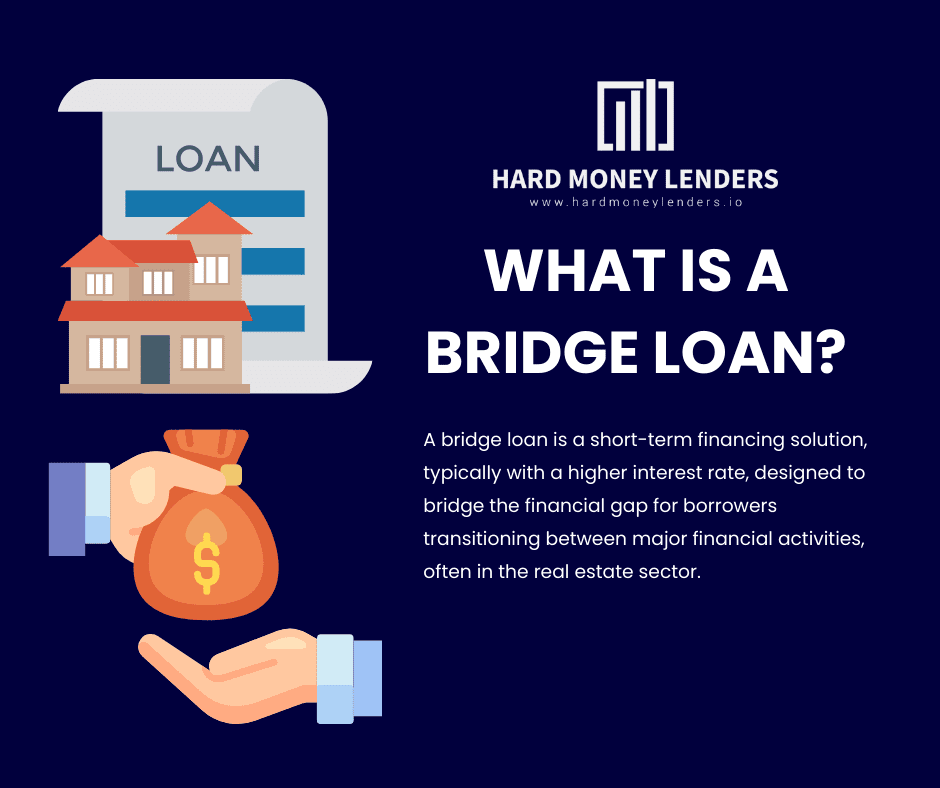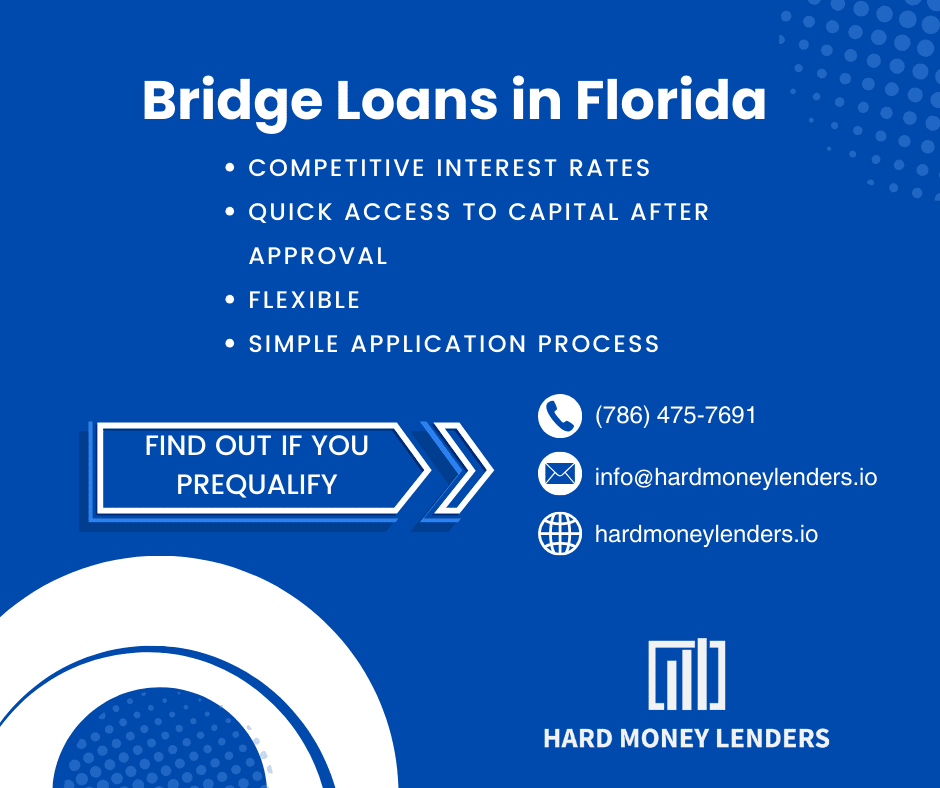Everything You Need to Know About Bridge Loans in 2024
Bridge loans in 2024 can be an excellent solution for those who want to purchase a second property before the closing of the sale of their first property. In other words, bridge loans are an attractive financing option if you want to sell your home to buy another one. With bridge loans, you don’t have to worry about being stuck in your old home while you wait for a sale because it will not affect your new mortgage application process. Our comprehensive Hard Money Lenders “Everything You Need to Know About Bridge Loans in 2024” guide dives into the intricacies of bridge loans, providing you with the insights needed to decide if this financing option aligns with your 2024 real estate goals.
What Is A Bridge Loan?

A bridge loan is a short-term financing solution, typically with a higher interest rate, designed to bridge the financial gap for borrowers transitioning between major financial activities, often in the real estate sector. It’s particularly useful for those looking to purchase a new property before selling their current one, offering a lifeline to cover immediate financial needs without the pressure to rush a property sale.
The bridge loan can serve as a substitution for the down payment and helps the borrower get over the hurdle of requiring a large amount of cash needed at closing time. That means bridge loans can provide leverage.
Now, the whole process can be completed within a week and can help you get over the difficult period that usually comes with waiting for permanent financing.
Many other lenders typically require a good credit score of at least 700 and a steady income to qualify for this type of loan. However, here at Hard Money Lenders, the minimum credit score requirement is 600 to potentially secure a bridge loan.
How Does a Bridge Loan Work?
Any individual or business can use a bridge loan. The company that offers the loan called the “lender,” will evaluate your credit history to determine if you are a good candidate for a bridge loan. If they decide that you are, they will provide you with a specific amount of money (based on your needs) and a specific amount of time to repay it.
Like any other loan, you’ll be required to provide collateral. However, the lender may rely on your credit history to decide how much collateral is needed and to pay interest rates.
Now, bridge loans are backed by the borrower’s current property as collateral, providing lenders with security against the loan. This type of loan allows borrowers to leverage the equity in their existing property to finance the purchase of a new property, essentially offering a financial bridge between selling and buying real estate.
The Benefits of Getting a Bridge Loan
 Bridge loans have some important advantages that will help you if you require short-term financing. We’ve listed out some of the benefits below.
Bridge loans have some important advantages that will help you if you require short-term financing. We’ve listed out some of the benefits below.
- Fast Access to Cash. Bridge loans offer you the funds you need quickly and let you move forward with your plans without unnecessary delays. If you ever need to borrow money quickly, bridge loans can help.
- Affordable. While the interest rates are much higher than other types of financing, they will work for those who don’t have an option for a more affordable loan.
- Flexibility. Borrowers can wait for the best offer on their existing property without missing out on new opportunities.
- Leverage. A bridge loan can provide leverage on the equity already invested in the current property, thus allowing the investor to make further investment with the potential of expanding the portfolio without the need to liquidate assets.
- Smoother Transactions. Bridge loans help ensure smoother real estate transactions by ensuring necessary funds are in place to transact, removing contingencies from the buying process, and making offers more attractive to sellers.
What Are Bridge Loan Rates in 2024?
Now, it when we talk about everything you need to know about bridge loans in 2024, we’ve got to talk about bridge loan rates. Before you even think about getting a bridge loan, you should know the prevailing market rates, including the prime rate, which typically influences bridge loan rates.
The prime rate is typically affected by the Federal Funds rate and LIBOR (London Interbank Offered Rate).
| Aspect | Details |
| Interest Rate Influence | Interest rates for bridge loans tend to hover above the prime rate, reflecting broader market conditions. |
| Loan Terms | Typically, bridge loans run for a 6-month to a yearlong term. |
| Payment Structure | Payments may vary; some require monthly payments, while others may allow interest-only payments or deferred payments. |
| Costs and Fees | Vary by lender; can include closing costs, origination fees, and appraisal fees. |
| Loan-to-Value Ratio (LTV) | Most lenders offer up to 80% LTV, that means at least 20% equity in the current home to qualify for a bridge loan. |
| Credit Requirements | Requirements vary by lender, with some requiring a credit score of 700 or higher and a debt-to-income ratio below 50%. |
Here’s a look at the historical Federal Funds Rate range between 2014 and 2024.
| Year | Federal Funds Rate Range (%) |
| 2024 | 5.33 (as of January) |
| 2023 | 4.33 – 5.33 |
| 2022 | 0.08 – 4.10 |
| 2021 | 0.06 – 0.10 |
| 2020 | 0.05 – 1.58 |
| 2019 | 1.55 – 2.42 |
| 2018 | 1.41 – 2.27 |
| 2017 | 0.65 – 1.30 |
| 2016 | 0.34 – 0.54 |
| 2015 | 0.11 – 0.24 |
| 2014 | 0.07 – 0.12 |
The USD LIBOR 6-month rate was 5.72% in February 2024. Currently, bridge loan rates in 2024 have hovered around 10-12% interest per year on a short-term basis.
The Risks of Getting a Bridge Loan
While bridge loans have some great advantages, they also have some drawbacks that potential borrowers should know before applying. We’ve outlined them below.
- High-Interest Rates. Due to the convenience and speed of bridge loans, they typically come with higher interest rates compared to traditional loans.
- Bridge Loans are short-term. Bridge loans provide you with money for only short periods. The loan length will depend on your lender. But this type of financing is usually only available for a few weeks at the most.
- The Debt-to-Income ratio requirements. Most lenders will require you to have a good debt-to-income ratio to qualify for bridge loans. This means that you will need to have a proven record of being able to pay off your monthly bills and the loan payments on time each month.
- Collateral requirement. If you don’t repay the bridge loan, this can lead to foreclosure on the collateral property.
Frequently Asked Questions (FAQ) About Bridge Loans in 2024
Who qualifies for a bridge loan?
You can apply for a bridge loan and quickly get the necessary funds to meet the minimum requirements. However, your credit score will also determine how much money is available to borrow, so it’s important that your reputation as a borrower remains strong when applying.
Do banks do bridge loans?
Private lenders are the most likely to offer bridge loans. However, it is done on a strictly short-term basis, and while an institutional lender may provide financing for longer periods, it requires extensive documentation before funding can occur.
Is my current home equity loan a bridge loan?
No. Even though you have bridged the gap between short- and long-term financing, your loan is still intended to be repaid over an extended period.
Also, many home equity loans are offered with fixed interest rates that make them quite different from their counterpart.
Do you need a down payment for a bridge loan?
Yes, many lenders will require a down payment. Make sure to ask about this when you are filling out the application for financing.
Is It a Good Idea to Get a Bridge Loan?
Whether a bridge loan is a good idea depends on your financial situation, the real estate market, and your ability to repay the loan within its short timeframe. It’s ideal for those with significant equity in their current property and confidence in their ability to sell it promptly.
 Are Bridge Loans Hard to Qualify For?
Are Bridge Loans Hard to Qualify For?
Qualification for a bridge loan can be challenging as it requires significant equity in the existing property, a strong credit score, and proof of income. Lenders also assess the borrower’s debt-to-income ratio and the feasibility of selling the current property within the loan’s term.
How Many Months Is a Bridge Loan?
The term of a bridge loan typically ranges from 6 to 12 months. In turn, this offers a short timeframe to manage the transition between buying and selling properties. Some lenders may offer more flexible terms based on the borrower’s circumstances and the property involved.
Can You Use a Bridge Loan to Flip a House?
Yes, bridge loans can be used to flip houses by providing quick financing to purchase and renovate properties before reselling them for a profit. This use of bridge loans is popular among real estate investors looking for short-term financing solutions.
Is Bridge Loan the Same as Hard Money?
While similar in providing short-term financing, bridge loans and hard money loans differ in their focus. Bridge loans are specifically designed for real estate transitions, often backed by the borrower’s current property. In contrast, hard money loans are broader, asset-backed loans that cater to various short-term financing needs, not limited to real estate transactions.
Is it hard to get a bridge loan?
The difficulty of obtaining a bridge loan can vary based on several factors including your financial situation, equity in your current property, and lending standards of the institution. Lenders typically require good credit, low debt-to-income ratio, and significant home equity. That said, working with a reputable lender and having your financial documents in order can streamline the process.
What Are Bridge Loans Backed By?
Bridge loans are primarily backed by real estate assets. The borrower’s current property acts as collateral, providing lenders with a security measure to mitigate the risk associated with the loan. This collateral requirement underscores the importance of having significant equity in the property to qualify for a bridge loan.
Final Thoughts on Everything You Need to Know About Bridge Loans in 2024
The benefits of getting a bridge loan are worth the risks. In the long run, you could save yourself from financial ruin by applying for one before your business fails or before your credit scores drop any lower. Bridge loans typically can be used to buy inventory and pay off debts. Consequently, you can keep going strong as an entrepreneur. While it’s not always easy to get approved for these types of short-term loans, they’re available if you need them most!

Yuval Elkeslasi is a distinguished professional in the finance industry, celebrated for his pioneering strategies and significant contributions as the leader of Hard Money Lenders IO. Hailing from Queens, New York, Yuval has built an impressive career, transforming the lending landscape through his expertise and visionary approach. Yuval Elkeslasi
attended Florida State University, where he obtained a bachelor’s degree in Finance. This academic foundation provided him with the necessary skills and knowledge to thrive in the competitive financial arena. Yuval’s tenure at Hard Money Lenders IO is marked by numerous pioneering accomplishments. He has introduced a variety of loan programs designed to cater to specific client requirements, including fix and flip loans, new construction financing, cash-out refinancing, rental property loans, and specialized financing for luxury items like yachts. Among Yuval’s significant achievements is securing an $8 million construction loan for a spec home builder in Port Royal, Naples. He also orchestrated the financing for a prestigious 72’ 2024 Viking Convertible yacht valued at $7.2 million. These transactions demonstrate Yuval’s adeptness at navigating complex financial landscapes and delivering exceptional results.

